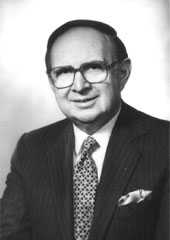Related Topics
American Finance After Robert Morris
Robert Morris can be fairly said to have made the American Revolution possible.
Whither, Federal Reserve? (2)After Our Crash
Whither, Federal Reserve? (2)
Personal Passions
My own personal short list; eight decades in retrospect.
Proposal: A Second Federal Reserve

|
| The Global Interdependence Center (GIC) |
The Global Interdependence Center (GIC) holds an annual monetary conference of considerable eminence, and this year it was held on the grounds of Drexel University. A featured speaker was Henry Kaufman, who has long been the voice of Salomon Brothers, a New York investment bank. Since one of the main activities of that firm has long been bond trading, what Mr. Kaufman has to say about the current credit situation is of considerable interest. Wasting no time with preliminaries, he dove right into the topic, which is characteristic of speakers with too little time to say what's on their mind.
Securitization has, in his opinion, been excessive. Computers have provided increased interconnectivity, increased speed, and consequently lack of transparency in the credit markets. Consequently, senior managers and directors lost track of events and therefore failed to restrain risk-taking. Especially, SIVs (hidden subsidiary corporations) increased risk without restraint. Excessive management compensation has had the effect of relaxing management control, and there has been too much credit floating around. The capital was chasing investment instead of the other way around. But in addition, the architecture of the system is at fault, and the problems just happened to hit subprime mortgages first. Short term money was supporting long-term obligations, which can be described as a conflict between the amount of risk and the duration it was at risk. No one who actually needs a bail-out should be allowed to have one.
 No one who actually needs a bailout should be allowed to have one. 
|
| Henry Kaufman |
That's all pretty succinct, and likely contains a lot of wisdom. But it was a quick preamble, after which the highly practiced speaker slowed down for the real point. The Federal Reserve, charged with maintaining stability, was timid and sluggish in recognizing the magnitude of the situation. There was the main focus on restraining inflation and increasing Fed transparency while neglecting regulation. He didn't say so directly, but one gathers he approves of regulation, disapproves of transparency, and is somewhat dovish about inflation. In other words, he is joining if he did not initiate, a gathering political chorus demanding more government regulation and less reliance on the market place to structure the economy.
So it comes down to this. Since the Federal Reserve is too preoccupied regulating small banks, it has been outmaneuvered by the big ones. What's needed is to form a new regulatory agency in charge of big banks and investment banks, with big-picture management of the institutions that really matter. He didn't make any suggestions about who should be the first chairman.

|
| Henry Kaufman |
The rest of the audience will probably be long dead after Henry Kaufman's image continues to shine, but nevertheless, there are some awkward features to this analysis and proposal. It fails to put enough emphasis on the blistering speed with which new schemes have been devised which really do benefit mankind even though the driving motive behind them may have been the purest sort of greed. The efficiency of the financial industry has been enhanced in a thousand ways, causing the cost of transactions to drop appreciably. The increased velocity, while it may have been motivated by a desire to cash in before others compete for it, is well known to increase the effective amount of money in circulation. The market finds itself with the tuna problem: to slow down is to die. One can even suspect that the excessive management compensation does not identify the buccaneer, it often represents the bribes engineered by young geniuses and intended to be offered to the older has-beens to get out of the road. Surely, the managers who have come up through the ranks are in a better position to ask questions and impose prudent restraints, than a new cadre of Washington bureaucrats who only hear of a gimmick after it has been run off the road.
It's easier to see what's the matter with this proposal than to identify what is better. The young cowboys at the computer screens of Wall Street are already better paid than the highest level of Washington, and their future aspirations are to become zillionaires in just a few more months. Someone fresh from these combat zones indeed knows what's going on, but he isn't going to give it up to become a regulator. So, Washington will instead recruit their brightest most idealistic classmates from the same Ivy League colleges, and train them in the most esoteric economic theory, They will be brilliant and attractive, idealistic and energetic, But they won't learn what's going on until that thing no longer matters and a new unsuspected one has taken its place. The only people who have a chance of controlling this zoo have been bribed to keep out of the way by astonishing compensation packages. If it's reform and regulation we need, here is the place to begin. Let's wait a bit to see what this thumping crash will do to get their attention.
Originally published: Monday, May 05, 2008; most-recently modified: Sunday, July 21, 2019